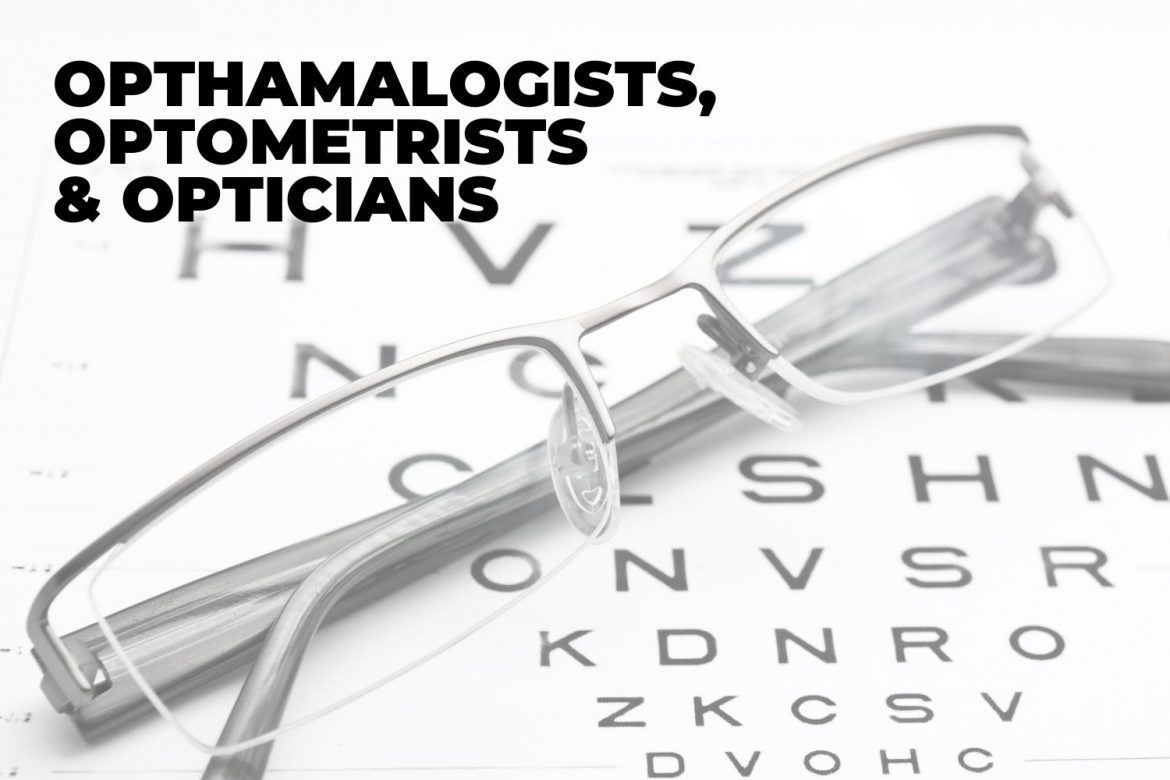
Have you started to notice subtle changes in your vision? Maybe you need to squint a bit when reading or perhaps you notice more frequent headaches or even some hazy, double vision while driving.
If anything sounds familiar, it might be time to schedule an eye exam. But who should you see?
Should you schedule an appointment with an ophthalmologist, an optometrist, or an optician. Whatever happened to the good ole eye doctor?
If you are struggling to choose the right type of specialist to visit when you are experiencing an issue with your vision, you’re not alone. Many people are confused when it comes to understanding the difference between ophthalmologists, optometrists, and opticians.
Ophthalmologists, optometrists, and opticians are all eye care professionals with a specific role in helping diagnose, treat, and care for your eyes. However, where the specialties differ is the level of training specifically required for the services provided by each type of provider.
Ophthalmologist: the eye doctor
Ophthalmologists are medical doctors. In other words, ophthalmologists spend 12 to 13 years engaged in the study of the eye, resulting in a license to practice medicine and surgery.
According to the American Association of Ophthalmology, ophthalmologists not only prescribe and fit contact lenses and glasses for patients but can also diagnose and treat diseases of the eye and perform a wide variety of surgeries, including procedures to address cataracts and glaucoma.
In addition to the traditional responsibilities described above, one to two years of additional study allow ophthalmologists to subspecialize in areas such as glaucoma, pediatrics, oculoplastic surgery, and neurology.
When to see an ophthalmologist
An appointment with an ophthalmologist should be scheduled anytime you experience severe pain or significant physical change in your eyes or if you experience any of the following:
- A loss of vision in one or both eyes
- Noticing flashes of lights, streaks, lines, or distortions
- Double vision, halos, black spots, or blurriness
- A change in the colors you see
- Having the sensation of curtain-like vision loss
Optometrist: the eyecare professional
Unlike ophthalmologists, optometrists are not medical doctors, but they are eye doctors licensed to practice in the field of optometry. Optometrists earn a doctor of optometry after four years of schooling and then typically complete an additional three years of postgraduate study.
Consider optometrists the primary care providers of the eye industry. Much like your physician is your primary health care provider, optometrists provide general eye health care, including eye exams and vision tests, prescribing and fitting general and specialized glasses and contact lenses, and diagnosing and treating certain eye conditions. While they are not able to perform surgery, they typically conduct the pre and post-surgical eye care associated with these procedures.
When to see an optometrist
Optometrists are typically able to address most routine eye care issues, ranging from eye exams and contact lens fittings to diagnosing and treating eye diseases and conditions.
Schedule an appointment with an optometrist for:
- Complete eye and vision exams
- Prescription glasses and contact lenses
- Difficult contact lens fittings
- Diagnosis and treatment of most eye diseases and conditions
Should you have an issue an optometrist is unable to address, such as severe or uncontrollable infections, retinal tears, or an eye disease that can’t be managed with prescription medication, you’ll get a referral to an ophthalmologist who specializes in your specific area of need.
Optician: the trained eye care technician
Opticians are typically considered the customer service representatives in an eye doctor’s office or vision center. They’re technicians trained to use the prescriptions provided by an ophthalmologist or optometrist to design and fit customers with the correct eyeglasses and contact lenses.
Opticians are not medical doctors, nor are they eye doctors. In most states, opticians are required to be certified by completing a one or two-year ophthalmic program and/or complete an on-the-job apprenticeship under the supervision of an ophthalmologist or optometrist.
When to see an optician
Opticians typically help patients with basic prescription eyeglasses and contact lens needs. Although they do not perform eye exams or treat any eye conditions, opticians provide a wide range of services, including:
- Filling and refilling prescriptions for eyeglasses and contact lenses provided by ophthalmologist and optometrist
- Assisting customers with measuring, proper fitting, and future adjustments of eyeglasses
- Fielding general questions related to eye care and eyeglasses or contact lenses
- Providing customer support, including helping to select eyeglass frames, working with insurance providers, and servicing routine requests and needs of customers.
When eye issues arise, it’s important to understand which type of provider you should contact. Remember, ophthalmologists perform eye surgery and provide care for the most serious of eye conditions. Optometrists are your general eye doctors who provide annual eye exams and prescriptions for eyeglasses, contact lenses, and medication to treat eye diseases and conditions. Opticians provide customer service and assist with filling and fitting eyeglass and contact lens prescriptions.

